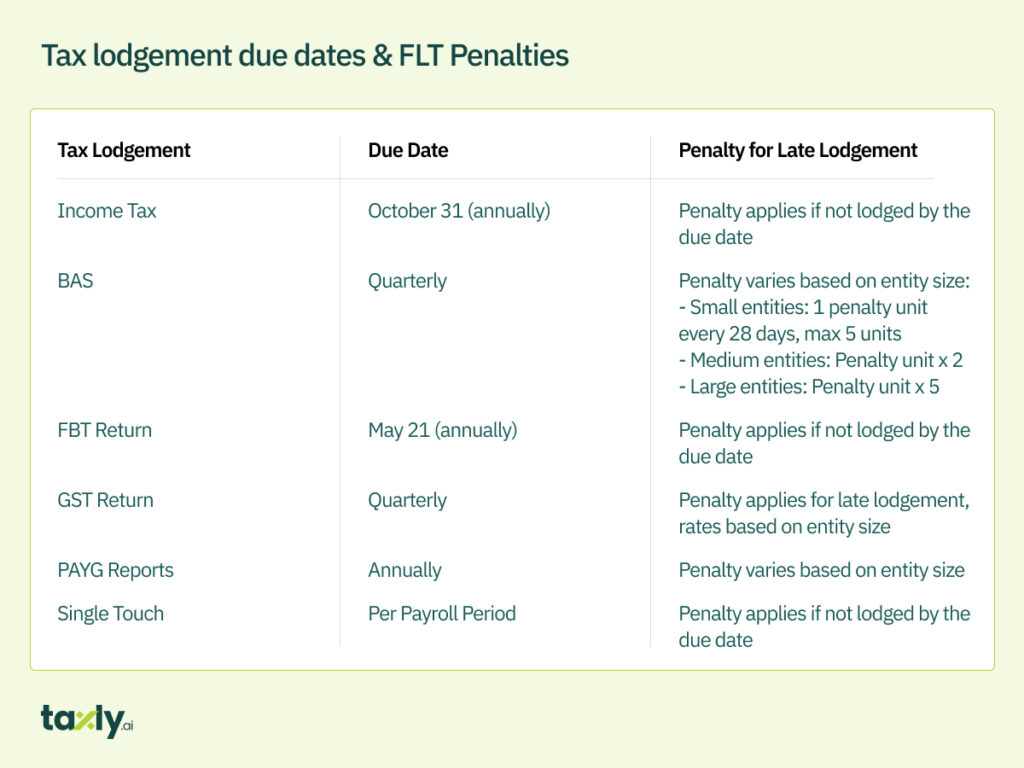An overdue tax return simply means you haven’t submitted your tax paperwork by the deadline set by the government. Think of it like a deadline for a task—except this task involves organizing your financial information and sending it to the tax office.
If you miss this deadline, it’s considered overdue. The tax office expects everyone to file their taxes on time to keep things running smoothly. If you don’t, they might send reminders or even impose penalties, kind of like a late fee.
For instance, let’s say you’re supposed to file your tax return by April 30th, but you forget or don’t manage to gather all the necessary documents by then. That would make your tax return overdue.
The longer you delay, the more it might complicate things. For instance, if you’re owed a tax refund, you won’t get it until you file that overdue return. Plus, there might be penalties or interest charges added to what you owe if you’re late without a good reason.
But the good news is, even if your tax return becomes overdue, it’s better to submit it late than not at all. Getting it sorted and sent in as soon as possible is key. And if there’s a valid reason why you’re late, it’s okay to communicate that with the tax office—they might be understanding and willing to help.
Ultimately, an overdue tax return is like missing a deadline; it’s best to address it sooner rather than later to avoid extra trouble.
What is the FTL Penalty on Overdue Tax Return?
An FTL (Failure to Lodge) penalty comes into play when you miss the deadline for submitting your tax-related documents, such as tax returns, reporting PAYG installments, or GST/PAYG withholding on an activity statement.
However, it’s not an immediate slap on the wrist. Sometimes life gets busy, and despite your best efforts, you might miss the due date. The tax office understands this and doesn’t rush to penalize for a one-off late lodgment.
Your circumstances matter here. ATO considers various factors before taking any action. For instance, if you forget to lodge, they’ll likely give you a heads-up through a phone call or a written warning. They want to make sure you’re aware of the situation.
Suggested Read: How to Lodge Tax Return in Australia?
But if they do decide to apply the FTL penalty, they won’t leave you in the dark. You’ll receive written notification detailing:
- Why the penalty is being applied.
- The specific amount you owe and a due date for payment which is typically at least 14 days after they inform you.

These due dates are critical to meet to avoid penalties for late lodgement.
How are FLT Penalties Calculated?
Calculating the FTL penalty isn’t a one-size-fits-all deal. It varies based on the size of your business and how long it’s been since the lodgment due date. Smaller entities might face a different penalty calculation compared to larger ones.
Small Entities FTL Penalties:
These are generally smaller businesses or individuals with relatively lower turnover or income. The criteria for defining a small entity may vary across different tax obligations but often involve businesses with limited annual turnover or income.
Penalty Rate: 1 penalty unit for each period of 28 days (or part thereof) that the return or statement is overdue.
Maximum Penalty: Up to a maximum of 5 penalty units for small entities.
Medium Entities FTL Penalties:
A ‘medium entity’ is one that acts as a medium withholder for PAYG withholding purposes or has assessable income or current GST turnover exceeding $1 million but less than $20 million.
Penalty Rate: The penalty unit is multiplied by 2.
Suggested Read: What Does Tax Withheld Mean in Australia?
Large Entities FTL Penalties:
A ‘large entity’ refers to a significant business or individual with substantial financial operations, having assessable income or current GST turnover of $20 million or more.
Penalty Rate: The penalty unit is multiplied by 5.
Significant Entities (Global) FTL Penalties:
FTL penalties for significant global entities apply to those that fail to lodge an approved form required on or after 1 July 2017. These are typically multinational corporations or entities with a significant global presence.
Penalty Rate: The base penalty amount is multiplied by 500.
These penalty calculations are based on the size and scale of the entity, with different rates applied for small, medium, large, and significant global entities. The penalty units and rates increase as the size and financial scale of the entity grow, reflecting the severity of the penalty for late lodgment based on their economic activity or turnover.
Overdue Tax Returns to which FLT Penalties are Applied
Now, ATO uses a system that automatically slaps a penalty on late submissions. This penalty can apply to various things you need to submit, like your activity statements, tax returns, reports about fringe benefits tax (FBT), annual GST returns, and more.
Automated FTL Penalties:
Applied to late-lodged returns, reports, and statements including:
- Activity statements
- Tax returns
- FBT (Fringe Benefits Tax) returns
- PAYG (Pay As You Go) withholding annual reports
- Single Touch Payroll reports
- Annual GST returns and information reports
- Taxable payment annual reports.
In specific cases of escalating non-compliance, manual FTL penalties might be imposed. For instance, when a taxpayer consistently fails to submit required documents after being requested to do so.
Exceptions for Penalties on Certain Lodgments:
But here’s a heads-up: not every late submission gets hit with a penalty. If you’re late but you don’t owe any extra taxes, maybe because you’re owed a refund or you didn’t make any extra money, they usually won’t penalize you.
However, penalties typically don’t apply to late submissions that result in no additional taxes owed, such as cases where a refund or zero tax is expected. Yet, exceptions exist:
- If an FTL penalty was previously applied, even if the late submission results in a refund or zero tax.
- When the late submission involves a third-party data report, like a taxable payments annual report.
- If you fall under the classification of a large entity, determined by your business size or financial turnover.
Can you Avoid Overdue Tax Return FLT Penalties?
If you receive a penalty notice for failing to lodge on time, you can request a remission if there are extenuating circumstances.
The ATO has the discretion to reduce (remit) the penalty based on your individual circumstances.
Applicable circumstances include
- Natural disaster.
- Serious illness, or other unforeseen circumstances beyond your control that prevented you or your agent from requesting more time to lodge.
Types of Remission:
There are two primary types of remission you can request:
- Full Remission: Requesting the complete cancellation of the penalty.
- Partial Remission: Asking for a reduction in the penalty amount.
How to request Remission
Contact the ATO:
Reach out to the ATO through their official channels, such as their website’s secure messaging or by phone.
Provide Detailed Information:
Explain your situation thoroughly, outlining the circumstances that caused the late lodgment. Include specific details and any supporting documents that can validate your case.
Highlight Extenuating Circumstances:
Emphasize any extenuating circumstances that affected your ability to lodge on time, such as a serious illness, unexpected events, or a natural disaster.
Request Type:
Clearly state whether you are seeking a full or partial remission. Be specific about the amount you’re requesting for reduction or cancellation.
Demonstrate Effort:
Show your efforts to rectify the situation, such as attempting to lodge or resolve the late submission promptly once the issue was recognized.
Use Official ATO Channels:
If possible, use the ATO’s designated forms or secure communication channels available through their online services for submitting your request.
Timeliness:
Submit your remission request promptly after receiving the penalty notice, adhering to any specified timelines or due dates for appeals.
By specifying the type of remission you’re seeking and providing detailed, accurate information, you increase your chances of a favorable outcome in reducing or waiving the FTL penalty.
The ATO considers genuine reasons for late lodgment and provides the option to request a penalty remission based on situations beyond your control. If you find yourself in such circumstances, it’s possible to appeal for a reduction or waiver of the penalty by explaining the situation to the ATO.
How to Be Safe from FLT Penalties?
The safe harbour provision shields you from an FTL (Failure to Lodge) penalty if you hired a registered tax agent or BAS (Business Activity Statement) agent to lodge your tax return or statement, given that both conditions below are met:
- You Provided Relevant Information:
You must demonstrate that you supplied all necessary tax information to your agent on time, enabling them to lodge your return or statement by the due date.
- Agent’s Failure Was Not Reckless or Intentional:
The agent’s failure to lodge your return or statement must not stem from recklessness or intentional disregard of the law.
To qualify for the safe harbour, you’ll need evidence that you furnished all relevant information to your agent within the stipulated time frame for timely lodgement. If, after assessment, it’s determined that the safe harbour provision doesn’t apply, you still have the option to request remission of the FTL penalty.
This provision acts as a safeguard for taxpayers who entrusted their tax matters to a professional agent and fulfilled their responsibility by providing the necessary information, ensuring timely lodgement.
Safe Harbour Exemptions:
For Amounts Below $10,000:
Call the Australian Taxation Office (ATO) to request the safe harbour exemption. They’ll assist you over the phone.
For Amounts of $10,000 or More:
Write a detailed explanation to the ATO outlining why there was a delay in lodging your return or statement. Describe the circumstances that caused the delay and provide reasons why you believe the safe harbour exemption should apply.
Be sure to include all relevant details and supporting information in your written request. The more comprehensive your explanation, the better it’ll help the ATO understand your situation and consider your request for the safe harbour exemption.
The Bottomline
Overdue tax return may result in FLT penalties, so it’s crucial to lodge a tax return even if past the due date. Seek guidance from a tax professional if necessary. If eligible, ask for remission of penalties due to genuine reasons like illness or unexpected events. Timely action can minimize penalties and avoid further complications with the tax office.
Discover More Topics


Comments are closed